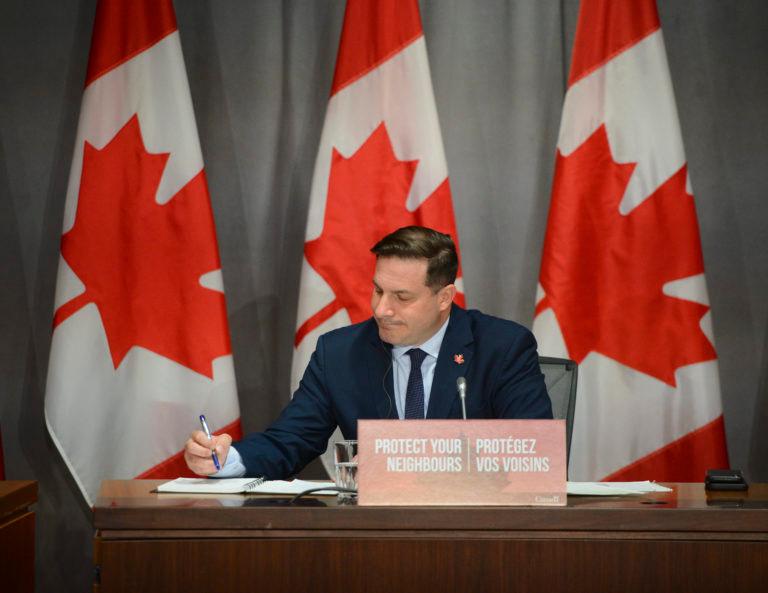Barbados is welcoming telecommuters, why can’t we?
Scott Gilmore: A new kind of visa to lure skilled workers would be hugely beneficial. Just don’t bother asking Ottawa why it hasn’t happened.

Mendicino takes part in a press conference during the COVID-19 pandemic in Ottawa on June 8, 2020 (CP/Sean Kilpatrick)
Share
Last month I proposed Canada should issue a new type of work visa that would allow people to live here while telecommuting to their jobs abroad. This week the government of Barbados announced exactly that—a one-year visa that permits you to stay on their tropical island while digitally working overseas. Prime Minister Mia Amor Mottley calls it the “Barbados Welcome Stamp”, and she is hoping it will attract long-term visitors, and large-scale tax revenue.
Barbados is suffering from a collapse in tourism dollars because short-term travel is not much fun if you have to quarantine on arrival and then again back home. A two-week vacation effectively becomes four weeks of house arrest. But, if you can stay in paradise for 12 months, a fortnight of lockdown becomes a trivial inconvenience.
What makes this new type of work visa especially interesting is that it not only addresses the quarantine problem, it also reflects the recent and historic shift in how people work. Since the Stone Age, we have always needed to live within a short distance of our livelihood. Whether you were tracking wildebeest or trading stocks, where you lived and where you worked were necessarily nearby. But the arrival of the internet gave us the tools to change this, and the arrival of the coronavirus forced us to try.
Now, after several months of working from home, hundreds of millions, if not billions, of people realize they can commute from anywhere. And I mean literally anywhere. Elon Musk’s Starlink satellite internet service is set to go online this year, providing broadband connectivity to almost every square inch of the planet.
The fact we have always needed to live near our jobs has been one of the defining organizational principles of every civilization. Breaking that link will create fundamental changes that we can’t yet predict, but the new Barbados visa provides a possible hint. Now that, by some estimates, one-third of the workforce can go anywhere, where will they go?
Mottley is hoping Barbados, but it would be hard to do better than Canada. We are annually ranked among the world’s best places to live, with an extremely high quality of life, excellent health care, low crime rate, a clean environment, relatively affordable housing, and a welcoming multicultural society.
If Canada followed Barbados’ lead, and offered an International Work From Canada visa, it would immediately attract hundreds of thousands of applicants. They would get a lovely place to live and we would get a new source of tax revenue. As policy innovations go, this one seems fairly obvious.
So, I reached out to the office of Canada’s Immigration Minister Marco Mendicino with three questions: Does Canada have a similar visa category already? If not, are we considering one? And, would a new type of visa require legislative approval?
Three days later, Minister Mendicino’s communications team got back to me. (As an aside, one thing most Canadians may not realize is that in Ottawa, “communications” professionals paradoxically believe their job is actually to prevent communications. In their view, there is no question benign enough or simple enough that it should be answered. Information, no matter how harmless, must only be given up after a vicious fight. There is almost nothing the public needs to know.)
In what the minister’s staff called a “response” to my query—because they were not shameless enough to pretend it was an “answer”—I was told that: “The Government of Canada has implemented a number of temporary measures, including travel restrictions, to protect the health and safety of Canadians and reduce the spread of COVID-19. Those travel restrictions remain in place and foreign nationals are prohibited from entering Canada for non-essential travel.”
The astute reader will note that these two sentences, that took them three days to craft and approve, have nothing to do with my questions. There are only a few possible explanations. First, Mendicino’s communication team is so incompetent, so confused, they honestly thought that was an answer. Second, Mendicino and his team do not know what visas currently exist, and have no idea how a new one would be created. Or, third, Mendicino and his hand-picked confederates believe you, dear reader, have no right to know any of these things.
Incompetent, ignorant or obstructive? My money is on a combination of 1 and 3, but I will let you decide on your own.
So, as is always required in this town, when you want to know something about the Canadian government, you ask someone who is not in the Canadian government. In this case, I turned to Professor Jamie Liew, an expert on immigration law at the University of Ottawa. Liew needed 15 minutes, not three days. And she had sharp and informed answers. To wit: Canada does not have an equivalent visa. To the best of her knowledge, no one in Ottawa is considering one. And, the minister not only doesn’t need legislation to create something similar to the Barbados Welcome Stamp, he doesn’t even need cabinet approval—he could draft and issue a new regulation today.
I therefore close with two pieces of advice for the minister. First, please consider the merits of an International Work From Canada visa. It is a modern policy innovation that reflects the reality of our increasingly complicated and competitive 21st century world and would do nothing but benefit this country. And, second, please call Prof. Liew. You would be far better served with someone like her on your team than any of the crew currently running interference between you and the public that elected you. (Minister, I’m dead serious. She’s easy to find. You need her. You’ll thank me.)